Essay on Leadership:
Shakespeare says, “Some are born great, some achieve greatness and some have greatness thrust upon them”. So there are leaders and leaders. The history of the world is the biography of its great men. Soldiers, however brave they may be, are useless without a leader. A leader appears on the scene. He brings order out of chaos; he gives a programme to the masses, whose energy was going to waste. He does great things, he makes others do great things. He makes heroes out of men of mud. Take the case of Netaji Subhas. He was a born leader. The mercenaries, who had been recruited to the Indian Army to fight and die for the British, had been taken prisoners of war. Out of this unpromising material, Subhas created his famous I.N.A. whose epic deeds are the brightest chapter in the history of slave India. Leadership is man alchemy which converts all base metal into gold.
Do deeds that the millions desire, but which the millions cannot do and you are the leader of the millions. Great deeds make great men. If your legal practice runs into thousands of rupees per month, you are a leader of the bar. A leading doctor is at the top of his profession. A mill-owner, whose profits are fabulous, is a leader of the industry. A newspaper that has a larger circulation than the rival journals is a leading paper. Leadership in such cases comes from higher skill, higher success and higher gains. This is not true leadership.
We know other examples of artificial leadership. In ancient times, kings were regarded as leaders and demi-gods. People believed in the divine rights of kings. A king was a leader of men, not because he possessed exceptional virtues of uncommon qualities, but just because he happened to be the king. The leadership was hereditary. It belonged to kingship, to the throne, regardless of the personality of the king. There was a divine halo around the king. People believed in blind hero worship. Even today some minister or an officer gets respect by virtue of his office, but on the whole, such artificial leadership is not in popular favour now.
A leader is the servant of the people. We remember the story in which Christ found his disciples quarrelling for leadership. Christ said, “Let the man who would be the servant of all, be the leader of all”. Some persons do great things for their personal benefit. A businessman works from morn till midnight. He kills himself with work and worry. He sacrifices his health, as does a patriot for his country. He makes millions. Yet he is not a leader of men because he lives not for others but for himself. Multi-millionaires die and the world knows nothing of their life or death. Their life or death does not make newspaper headlines. Yet poorer people, who sacrificed their all for the good of others, find lodgement in men’s hearts and find a place in history. For, those who give their life for others, save it; while those who hoard it, lose it. So the first quality of a public man is that he lives for others. As Mahatma Gandhi said, “I claim to know my millions. All the 24 hours of the day I am with them. They are my first care and the last; because I recognize no god, except the God that is to be found in the hearts of the dumb millions”. Petty minds care for selfish gain and for the good of their family and the relations. Petty minds, selfish gains and leadership do not go together. A leader sacrifices his all for the good of others. To him, all humanity is his family that deserves his help. When someone enquired from Gandhiji about the health and welfare of his children, he said that all the Indians were his children and that some of them were happy and some miserable. He who has an eye on personal advancement can never rise to great heights of leadership. Gandhiji at the end of his big autobiography says, “I must reduce myself to a zero”. A leader then does a golden deed for the service of humanity. The masses are the mainstay of a leader.
A leader’s life is generally hard. Gandhiji, Nehru, Patel and Stalin spent long years in jail. They have been brought up in the school of adversity. It is not from palaces but from poor men’s cottages that most of the world’s leaders are drawn. Nehru might be an exception; he comes of blue blood. But Stalin was the son of a cobbler. Shakespeare’s father was a butcher and a wool merchant and once went into bankruptcy. America’s famous President, Abraham Lincoln, who abolished slavery and saved his country from being split into pieces, was born in a one-room house in the jungle. From log cabin to the White House was his career. In childhood, he read books by the light of the kitchen fire; he could not afford a lamp. Once he borrowed a book from another boy. The book was spoilt by rain. As Lincoln could not afford to pay the price of the book, he had to work on the owner’s field for three days. Through such dire need and poverty, Lincoln grew up to be the greatest American of his time.
A coward cannot be a leader. Courage and bravery have been hallmarks of many leaders. Hitler was a soldier. Gandhi and Nehru never knew what fear was. Lincoln was ten years of age when his father went away leaving the children in the jungle. In the jungle-home lived the three children all alone, a sister aged twelve and another boy aged five. The father returned after five months. John Brown, who with Abraham Lincoln, was responsible for abolishing slavery in America, had a very adventurous childhood. At the age of 12, he took a herd of cattle all alone, over a hundred miles.
In the modern world, age and experience count for leadership. Nehru is above 67, Churchill is 81, or more. President Eisenhower and Marshal Bulganin are over 60 or 70. and they guide the destinies of their nations. Marshal Petain, France’s war-time Prime Minister, was 90. It looks strange that in modern times when a premium is put on youth, old men hold the reins of government in many countries.
Great men are fired with a devotion to one idea. A servant who loses his life for the sake of his master, or a lover who sacrifices his life for his beloved, maybe praiseworthy, but such men are not heroes. A hero’s devotion is not to a person or a group of persons, but to an idea. Subhash’s burning passion was the freedom of the motherland. Nehru spent the best years of his life in British jails for achieving the independence of India. The prime motive of Washington’s life was the liberation of the U.S.A. Lincoln’s idea was to abolish slavery and keep his country united. Garibaldi became world-famous as he lived and died for the liberty of Italy. Nearer home, Mr Jinnah lived and worked for an idea- that of Pakistan. His methods were questionable, but he rose to leadership, as he had no selfish axe to grind. As Gandhiji says, “Courage, endurance, fearlessness and above all self-sacrifice are the qualities required of our leaders. A person belonging to the suppressed classes exhibiting these qualities in their fullness would certainly be able to lead the nation; whereas the most finished orator if he has not these qualities, must fail”.
In modern times, leaders are orators or men of letters. Hitler’s fiery speeches roused the fallen German nation to great deeds of heroism. Hitler’s speeches lasted for hours. Churchill is an orator and a writer. During the dark days of World War II, Churchill’s speeches served as a tonic to raise the drooping morale of the nation. Gandhiji every day gave a speech at his prayer meeting. He always edited a paper. The public also got into touch with his view through books. Nehru resembles the Master in being a powerful orator and a man of letters. Audiences at his lectures run into lakhs. Nehru’s books have been best sellers in foreign countries. Fiery speeches and great books influence the minds of the millions.
A leader must give a lead to his followers. He must have original ideas that would work and make history. He catches the imagination of the people. For instance, the Indians wanted independence but did not know how to proceed. Gandhiji appeared on the scene and gave a completely new idea of a non-violent struggle. The first part of the plan was the Salt Satyagraha. It does not appeal to reason what connection there can be between salt and independence. And yet subsequent events proved Gandhiji to be right. After the First World War, Germany lay defeated and disheartened. Hitler gave to the Germans a new programme and a new hope. Where others are at a loss to know what to do, the leader gives them a concrete programme. All cannot be leaders, but all can be bearers and followers. A leader never wavers, he is never in doubt, he has a quick power of decision. Others talk and discuss; he gives his opinion and that becomes the opinions of the people. The thinking is done by the leader and the doing by the masses.
A leader must understand the mass mind and mob psychology. Gandhiji always had his finger on the pulse of the people. He could read the mind of Indian masses like an open book. He knew when to start a movement and when to call it off. While others attribute miracle-making power to Gandhiji. Nehru thinks that his supernatural power lay in reading the mass mind. People are fond of hero-worship and leaders supply a real want.
Bacon says that great men are thrice servants- they are servants of the state, servants of work and servants of fame. A great man becomes greater by virtue of his position. Stalin became a greater leader than Trotsky, for Stalin was the head of the Russian Government. Leaders are also servants of work. Gandhiji could hardly get two or three hours for sleep. Many of the leaders have a 16-hour day. Again, great men are servants of fame. They weigh every word that they speak or write. They have to look to their fame at all times.
| “Fame is the spur that clear spirit doth raise (The last infirmity of noble minds) To scorn delights and live laborious days”. —— Milton |
The leaders of war thunder for a while, but the leaders of peace have a more enduring position. World-conquerors like Julius Caesar, Alexander, Changez Khan and Napoleon are certainly remembered, but their place in people’s hearts is not as great as that of prophets and apostles of peace like Christ, Gandhi, Buddha and Mahavira. The world does not know the names of the inventors of the Atom bomb; the name of Gandhi, who gave the message of peace to the war-weary world, is a household word all over the globe.
True leaders rise to eminence not by blood and sword, not by fear or force, but by willing obedience of the people. They don’t throw the opposition in jails or exile, they bind them with the golden thread of love. They make conquests of hearts not of foreign territories. They have infinite self-confidence. They make a programme and stick to it through rain or shine and whether storms rage or the waves roar. Their life is one constant struggle, excitement and activity. They are heroes in the battle of life. They are supermen. They demonstrate that God created man in his own image.
| “Made weak by time and fate, but strong in will To strive, to seek, to find, and not to yield”. …….Tennyson |

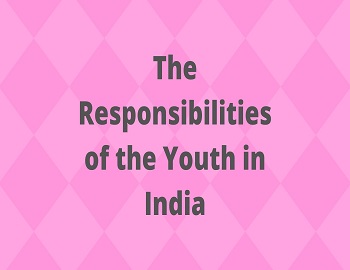
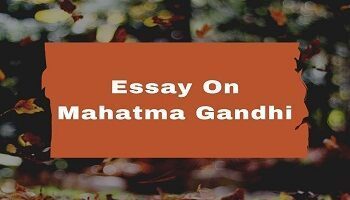
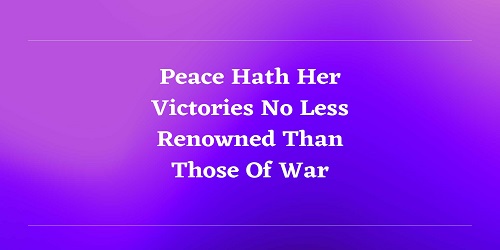



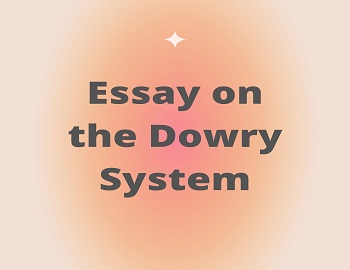
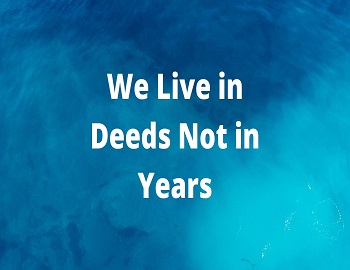
Comments (No)